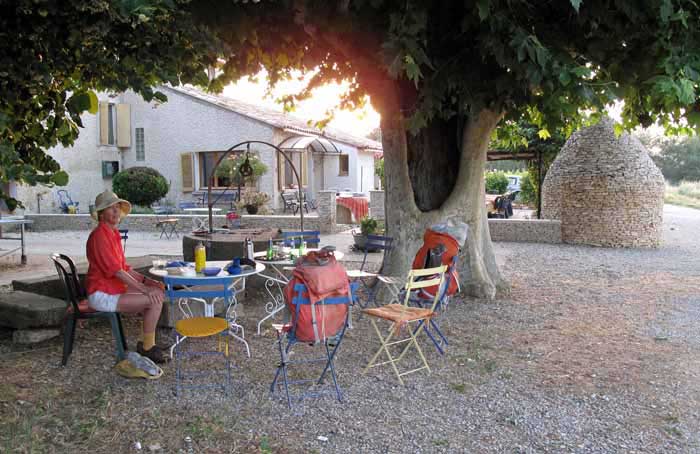
Thursday, 28 June 2012
Distance 26 km
Duration 5 hours 40 minutes
Ascent 255 m, descent 402 m
Map 164 of the TOP100 lime-green series
The only other person awake when we got up was our hostess, Isabelle, who was preparing the long table for breakfast.
We ate our humble muesli at one of the small tables and left at 6:30, after thanking her yet again for the unexpected sanctuary.
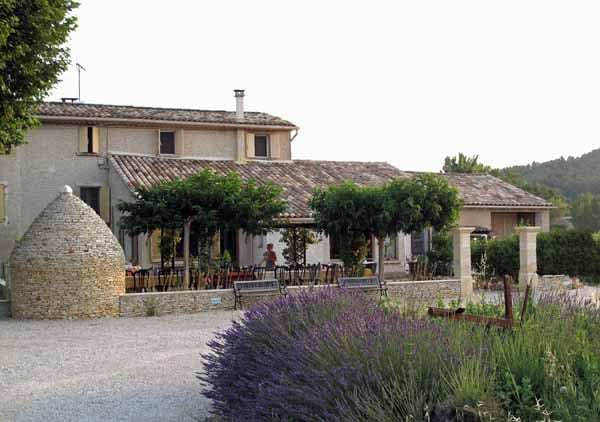
We were in much better spirits than we had been when we arrived, and it was a beautiful summer morning.
A light haze hung over the range of the Luberon to the south but the valley was full of gentle sunlight, illuminating the vineyards which spread out on both sides from the tiny road that we were on.
There were also orchards of apricots and cherries, orderly and abundant.
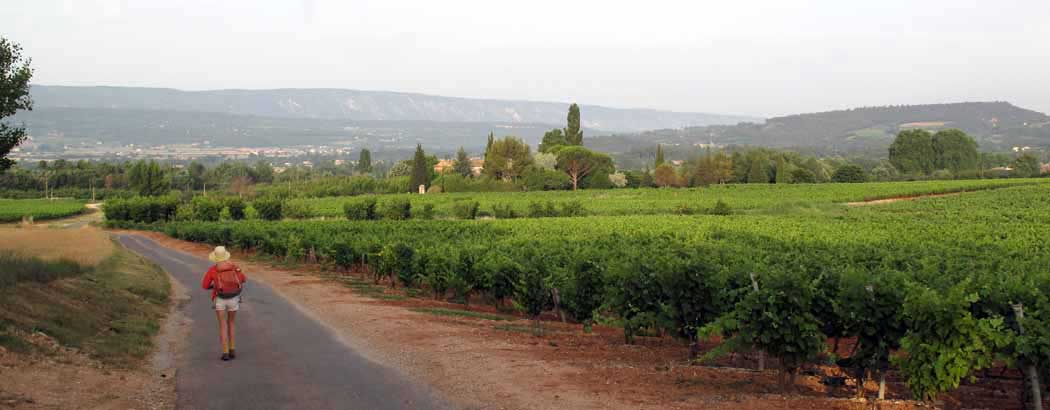
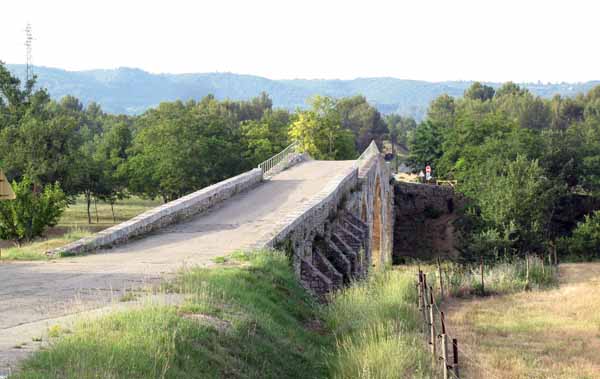
Our immediate destination was the Pont Julien, built by the Romans and still standing.
This would be a point of intersection with our walk in 2007, when we crossed it on our way from Lourmarin to Roussillon.
Our meandering lane eventually merged with the highway and we walked beside it for a few hundred metres until the bridge appeared.
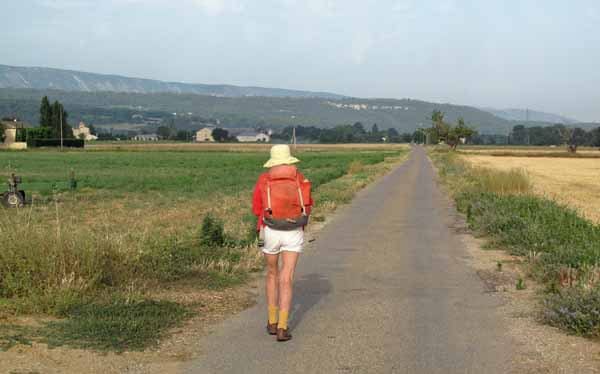
Although it looks as sturdy as ever, it is no longer used for traffic, possibly out of respect, but we walked over it and joined an abandoned railway line that took us along beside the river.
After three or four kilometres we turned off, crossed the highway, and began the ascent to the perched village of Goult.

The air was not as fresh as it had been, and nor were we, but half an hour of trudging brought us to the top of town and by nine o’clock we were sitting comfortably at a bar with coffee and croissants spread out before us. It was a lovely hour for a second breakfast.
The village, like most in the Luberon, was an extremely picturesque maze of crooked lanes, with trees and flowers crammed in to every available chink.
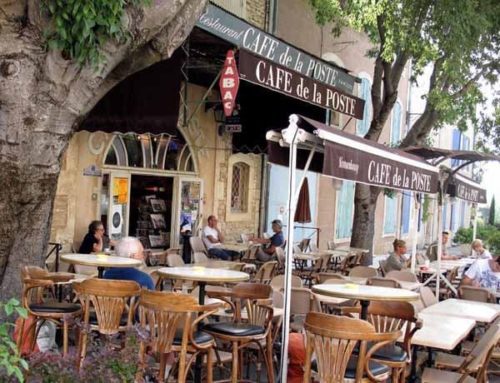
We duly got lost in this maze as we tried to make our way down, and ended up at the top edge of the village near a windmill, looking down over a forested hillside.
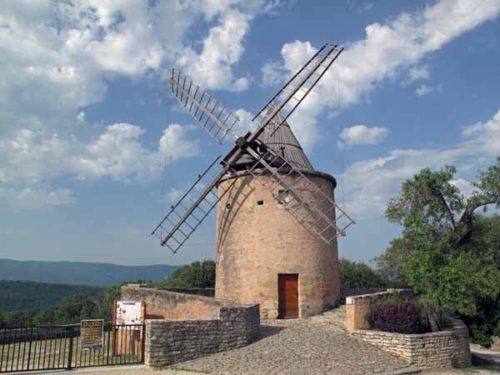
There was no road, only a gravel path that was signposted to “les Terraces”. It looked like a good direction, so down we went and soon found ourselves in a most fascinating relic of early farming techniques.
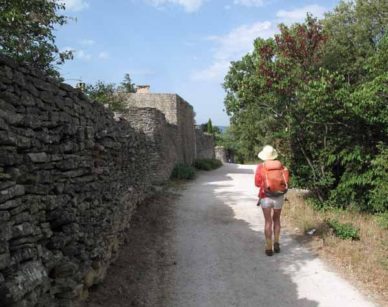
The whole south-facing hillside, sunny and protected from the mistral, had been terraced with drystone walls, some bordered by low stone cabins.
To get from one field to another, there were flying staircases set into the walls.
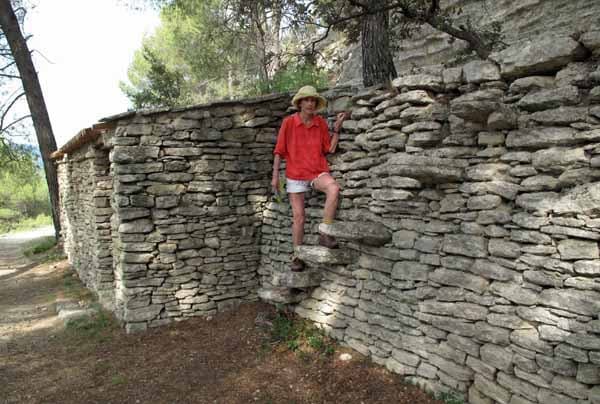
The fields were neglected now, but a few olive and almond trees remained, descendants of the orchards that had flourished there before the great depopulation of the French countryside.
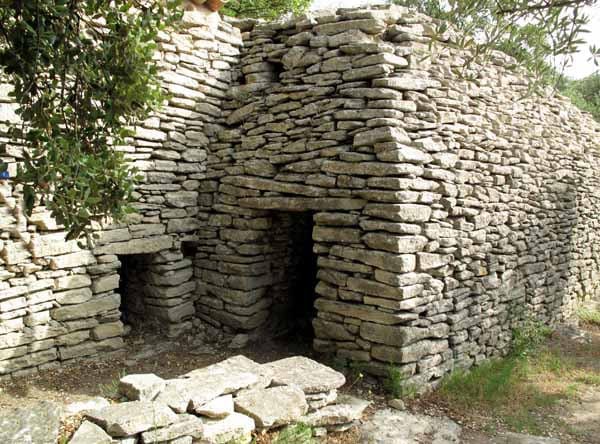
At the bottom, the official path turned back to climb towards the village, so we had to scramble down through a mass of shrubbery to get to a small road, then go along it until we worked out where we were.
We came to the village of Lumières just before reaching the highway, and as we looked to the right, past the grand old buttressed church, we saw a sign for a bar (our vision is finely attuned to such things).
An hour had passed since our last refreshment, so we indulged in another round of coffee and got our water bottles refilled with iced water.
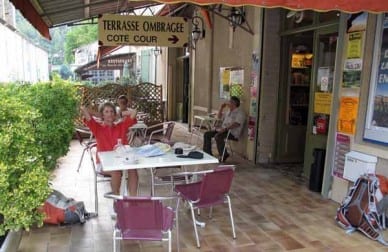
Once over the highway, we crossed the river and the flood plain and came to the GR for the first time that day. It was the GR653D, the backward extension of the Way of Arles.
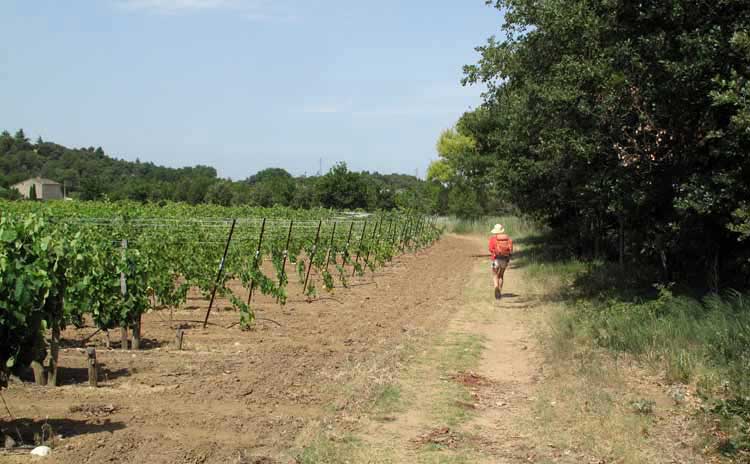
It followed a side road that curved away uphill, but at the next corner it left the bitumen entirely, scrambled up over a bank of dirt and continued through the forest on a pleasant path between the river and a rising slope.
Unfortunately the heat was now ferocious, even in the shade, and we soon had to stop for a rest and a long swig of water.
Then we skirted a vineyard, came to a small road, and emerged onto the D103. At this point the GR went downhill, but we were aiming for Maubec and turned the other way.
We had intended, when we set off in the freshness of the morning, to deviate to the Plus Beau Village of Ménerbes, and we could now see it high ahead, tucked into the flank of the Petit Luberon, bleached by sun and distance.
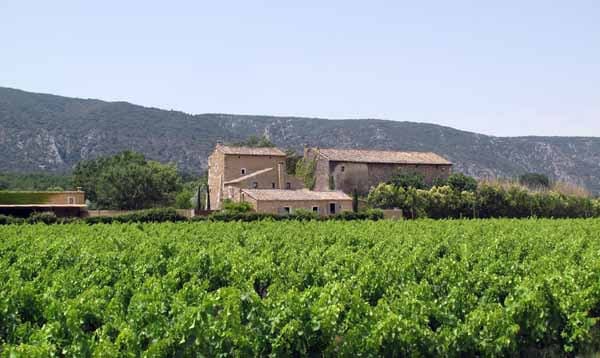
But we were fading fast and just wanted to get to our destination. No amount of rustic charm could compensate for the extra effort in such crushing heat.
The D29 took us through vines and fields of wheat to the D3, where we went to the right and enjoyed a period of flat walking.
At the sign to Oppède we turned off and began climbing again, into the outskirts of the village. We never quite worked out why it was called les Poulivets on the map, but Oppède on the signs.
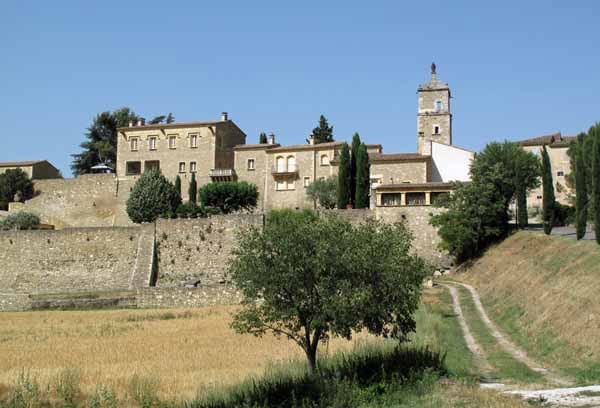
The first thing we came to was the church, where we sat down on the graveyard steps under some ancient plane trees to gather our strength. We shared the shade with a gang of roadworkers who had stopped for lunch.
In the centre of the village there were a couple of bars whose terraces were full of diners and it was tempting to join them, but the greater need was to finish the day’s walk, so we trudged on. It took about an hour, the sun beat down without mercy and I went more and more slowly.
Turning off the D29 at last into Maubec (following signs to the camping ground), we passed a few closed shops, then a school from which happy treble voices floated, the only sign of life in the whole place. The centre of the village seemed to consist of a vineyard.
It was quite a steep climb to the crest above the vineyard, where there were two handsome churches surrounded by pines, and a cluster of houses. Among them Keith thought he saw people dining under an awning, but I doubted it.
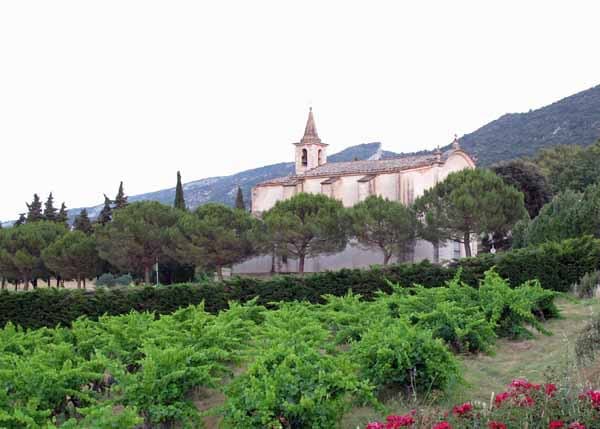
The camping sign directed us on between the churches and down into a slight valley at the base of the mountains, where we saw caravans and tents and realised that we had finally arrived. I almost cried.
It was a dusty, terraced slope with patches of dry grass under olive and chestnut trees. The office was closed (it was 1:30 pm), but the woman in charge was chatting outside and invited us to settle in, so we found a spot between the caravans, cast ourselves down on our bedrolls and did not move for a long time.
One of our neighbours, a Dutch woman, evidently worried about our condition, came over with a bowl of ice cubes and we sucked them gratefully with our lunch. Finally Keith staggered down to the showers, which he found totally delightful.
We have a little five-point scheme of our own for comparing the showers at camping grounds, with one point each for temperature, strength of flow, adjustability of the former two, size and convenience of cubicle, and general elegance. On this scale, Keith scored the showers at Maubec at a magnificent 5, which galvanised me to try them as well and I agreed.
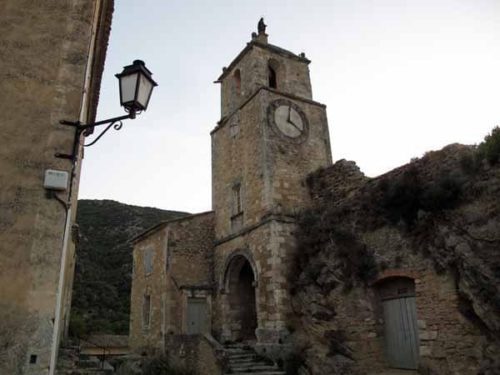
As we lay on our sleeping mats waiting for the day to cool down, another walker appeared, a middle-aged Frenchman in sandals, who had come from Bonnieux that day, having started his pilgrimage in Moustiers-Ste-Marie.
He was so hot and tired that he stripped down to his underpants and collapsed onto his mat not far from us.
I read from my wonderful Kindle, the walker’s friend – a library of books for half the weight of one paperback. This was a birthday present from Keith and had miraculously removed the danger of running out of reading matter whilst in France.
Restored by this inactivity, we rose and walked very slowly back to investigate the possibilities for dinner.
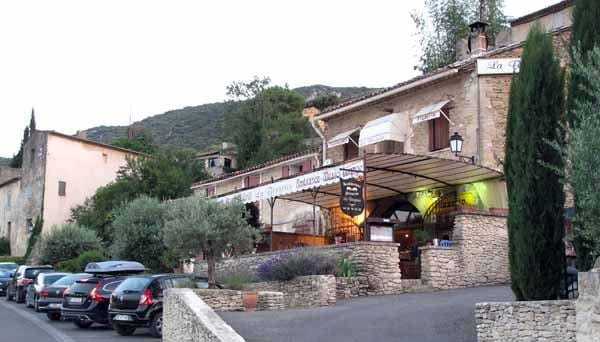
Past the church, which was on the top of the ridge, a narrow staircase led down through what looked like the original village. The stairs had recently been repaired clumsily with concrete.
We came out just above the vineyard and saw the awning that Keith had noticed on the way up. It was indeed a restaurant – la Bergerie – and showed every sign of being open this evening.
Back at the camping ground, the manageress was still not interested in opening the office – later, she said airily.
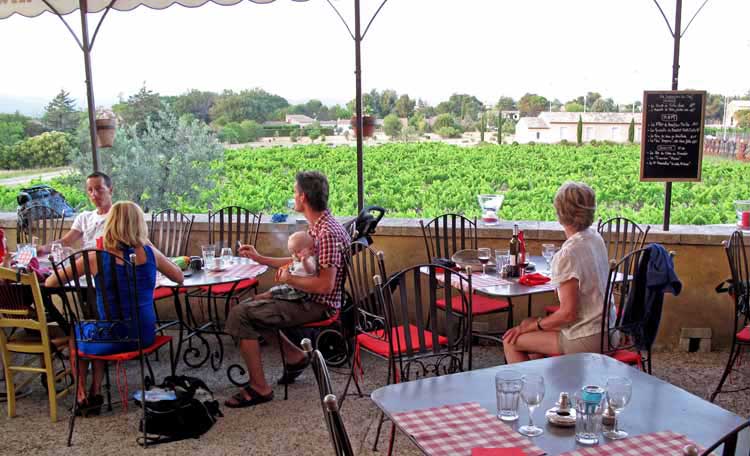
Our fellow walker had been down to the épicerie and bought some food, which he was munching on a log.
I did a little needlework – I sewed coloured threads onto the detachable legs of my long pants, to avoid the mental exertion of sorting left from right.
At 7:30 we set off again and this time the restaurant was open. Already the terrace was almost full, but we got an excellent table looking out over the vines and the lower village.
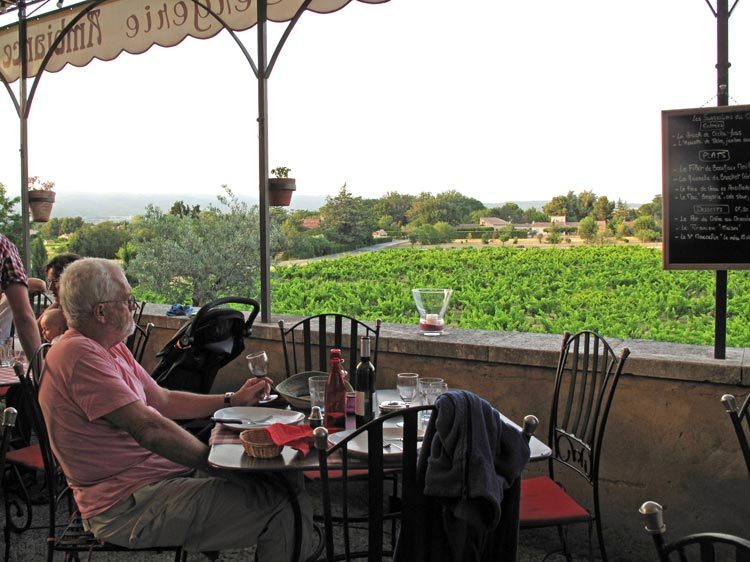
After leisurely apéritifs we shared a salad for our first course, which the cook kindly arranged in two bowls.
It was an establishment of some style and did not serve house wine in the evenings, so we got a 500ml bottle of local red instead of the usual carafe.
Our main course, as so often, was steak, with ratatouille, other lovely vegetables and optional chips (which I declined).
The meal was a great comfort after the trials of the day, but on the other hand, the heatwave was predicted to continue and we had no wish to repeat these trials tomorrow, so we decided to go no further than Cavaillon, a very short stage, then take refuge in a hotel.
As to this night’s accommodation, the office was still closed and the woman had gone, so it ended up costing us nothing.